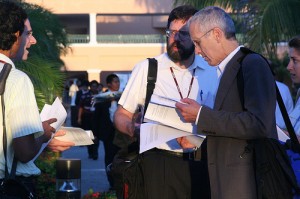Agenda to Save the World
Posted on 11. Apr, 2011 by astark in U.S.A.
As each round of the UN climate negotiations draws to a close, I am left with the implausibly optimistic feeling that the talks cannot possibly get more frustrating, the issues more complex, the discussions more opaque. Yet the latest round of talks which wrapped up in Bangkok last week did its level best to push even the most sanguine among us towards despair that any real progress will ever emerge from the UNFCCC. Like the movie Groundhog Day, the same negotiators returned to the same bleak hallways to do the same thing that they had done at every round of negotiations before it: bicker about the agenda.
Even to those who are familiar with the torpor and inertia of the UN climate talks, the outcome of the week-long Bangkok intersessional- a one-page agenda document-is almost shocking. Coupled with a the souring of the nearly ecstatic mood at the close of the COP-16 in Cancun (U.S. negotiator Jonathan Pershing called the mood in Bankgok “less rosy” than it was at the beginning), the lack of demonstrable progress seems like reason enough to give up on climate talks ever succeeding, at least in this forum.
But there’s a silver lining to all this: while the UN climate talks may sometimes resemble a slow-motion train wreck from the outside, in context they are more like a train wreck in reverse. From a multitude of circumstances and perspectives, over the years negotiators have managed to cobble together a reasonable shared vision of what problems need to be solved and the broadest outline of the kinds of mechanisms that might be used to start to find solutions to these problems. Yes, there are a number of standing contentious issues where agreement seems far, far away, from what form an emissions reduction treaty should take, to how countries should report progress towards their emissions goals, to how funds should be raised to finance climate adaptation in the developing world. And yes, it often seems as if negotiators spend precious negotiating time setting an agenda. This time, they couldn’t agree on whether to move forward on the broad outlines of the Cancun Agreements, or take on a more ambitious agenda that adheres more closely to the 2007 Bali Action Plan.
Yes, the Bali, Copenhagen and Cancun agreements are also agendas in themselves, that outline broad steps for future action rather than lay out specific points of agreement, so in a way, negotiators are rehashing the same ground. Yet each time they do, a broad agreement on what needs to happen next comes into sharper focus. After all, as a result of the Cancun Agreements, countries came to an agreement on a program to halt tropical deforestation, and are currently working to set up a Green Climate Fund to finance mitigation and adaptation actions in developing countries, as well as an adaptation committee and a technology transfer committee. There was no final agreement on emissions reduction goals, but more countries came on board to the idea that there should be such goals in the first place, and they did all agree on the broad outlines of a system for monitoring and reporting progress towards these goals.
I wasn’t in Bangkok last week, but I have an idea of how the NGO observers felt as the week went on: optimism and high spirits at the beginning of the week (colored perhaps by a touch of jet lag), concern as negotiations slowly become mired in a myriad of technical details and lack of political will, frantic concern while locked out of late-night negotiations going into the final days, and sheer, euphoric relief to find that negotiators had been able to scrape together some kind of agreement that would carry the talks through to the next round, only to begin all over again. With each rollercoaster ride of despair and euphoria, the negotiators take a tiny step forward toward a more comprehensive climate agreement, and an agenda to save the world.
Negotiator Tracker - Alex Stark
Alex Stark joins the project from Washington DC, where she's focused on legislation addressing drivers of violent conflict around the world, including the effects of climate change. Tracking the US negotiators and getting the word out about action inside the UNFCCC combine her passions for activism, sustainable development, conflict prevention and US foreign policy. read more»
Read more of Alex's posts here.
Follow Alex on twitter @AlexMStark








